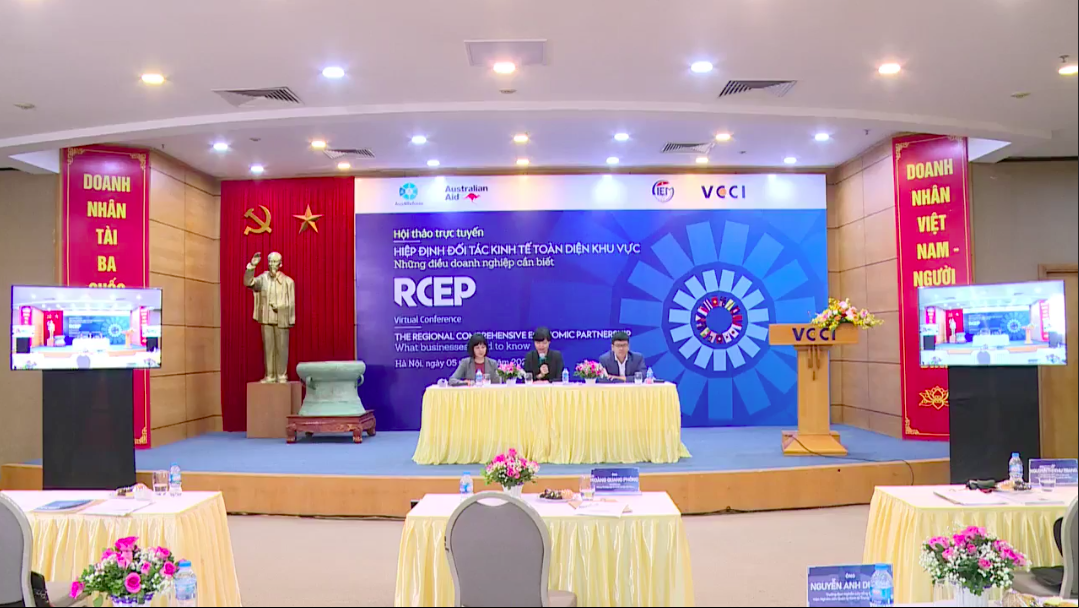RCEP provides Vietnam with strategic opportunity in shaping regional trade structure
The deal could be the new driver for Vietnam’s economy to speed up the recovery process and thrive in the post-pandemic period.
More than economic gains, the Regional Comprehensive Economic Partnership (RCEP) has provided Vietnam and the ASEAN with a strategic opportunity to participate in the process of shaping regional trade structure.
| Overview of the event. Photo: Hai Yen |
Head of the General Research Department under the Central Institute for Economic Management (CIEM) Nguyen Anh Duong gave his assessment in a conference discussing the RCEP prospects today [November 5].
Duong referred to a joint statement from leaders of the Asia-Pacific Economic Cooperation (APEC) in Peru 2016 that noted the formation of the Free Trade Area of the Asia Pacific (FTAAP) should be built through possible pathways including the Trans-Pacific Partnership (TPP) [presently known as the CPTPP] and RCEP.
“Vietnam now as a member of both the RCEP and CPTPP would be in an advantageous position to better engage in drafting the game rules in the region that ensure benefits for its people and enterprises,” Duong asserted.
“The issue is especially significant at a time when there is growing concern from countries for WTO reform and the rise of protectionism” he added.
Meanwhile, Duong noted, the RCEP, seen as a mega trade deal between ASEAN and five partners (China Japan, South Korea, Australia, and New Zealand), is an example of ASEAN’s central role in pushing for new initiatives in the region.
“ASEAN has been the key player in pushing for a regional trade framework, which ensures compatibility of the bloc’s existing free trade agreements with its partners,” he added.
From this deal, Duong said Southeast Asia could become an ideal place to try new ideas or indirect routes in the search for new opportunities towards global economic integration.
In short term and amid the Covid-19 pandemic, Duong expected the RCEP would further give Vietnam and other countries a handier tool to navigate the economic impacts.
Hoang Quang Phong, Vice Chairman of the Vietnam Chamber of Commerce and Industry (VCCI), echoed the view by saying the RCEP consists of Vietnam’s most important trading partners.
In 2020, trade turnover between Vietnam and RCEP countries accounted for 55% of the total revenue of the Indochinese country, of which exports amounted to 41%, and imports to 71%.
In addition, foreign direct investment (FDI) from RCEP to Vietnam as of October 2021 contributed to 62% of total commitments to the country.
“Facing unprecedented impacts from the pandemic, the RCEP could be the new driver for the economy to speed up the recovery process and later thrive in the post-pandemic period by further integrating into regional value chains,” he suggested.
Nguyen Thi Thu Trang, director of the WTO Center and Integration under the VCCI, however, urged local enterprises to gain a better understanding of Vietnam’s commitments and possible impacts from the RCEP to maximize its benefits.
According to Trang, a survey conducted by the VCCI in 2020 showed the level of understanding of local enterprises on FTA commitments was at a modest level of 23%.
Giving a more detailed look at the deal, Deputy Director of the Multilateral Trade Policy Department under the Ministry of Industry and Trade (MoIT) Nguyen Thi Quynh Nga noted the RCEP is not aimed at accessing more markets, but multilateralizing ASEAN+FTAs, especially on rules of origin and trade facilitation.
“The RCEP’s goal is to facilitate the consolidation of regional supply chains and post-Covid-19 economic recovery,” Nga said.
This, however, would not hide away the fact that with over 70% of Vietnam’s imports coming from RCEP countries, Vietnam, thus, faces a significant risk of a higher trade deficit which eventually undermines its economic fundamentals, she added.
Nga noted it is clear that challenges and opportunities from the RCEP are equal, saying only when Vietnamese companies are able to become more competitive and be more active in the value chains, then the risk of trade deficit would not disappear.
“Failing to adapt to new competition would turn opportunities into challenges,” she warned.
Nevertheless, Nga added the MoIT is committed to promoting communication and dissemination activities for the agreement in order to raise awareness of businesses and people on the RCEP.
“The MoIT would closely monitor the implementation of commitments by partners, so that it can take timely response measures to protect Vietnam interest in compliance with the RCEP requirements and domestic laws,” Nga said.
The RCEP agreement will officially come into force after 60 days from the time when at least six ASEAN countries and three partner countries complete the procedures for approval/ratification of the Agreement and deposit their instruments of approval/ratification with the Depositary (ASEAN Secretary-General). Until November 2, 2021, six ASEAN countries (Singapore, Brunei, Laos, Cambodia, Thailand, Vietnam) and four partner countries (China, Japan, New Zealand, Australia) have deposited with the ASEAN Secretary-General, meaning the agreement will come into force from January 1, 2022. RCEP is an FTA with the largest market size in the world as its accounts for about 30% of the world's population (2.2 billion people) and 30% of global GDP ($26.2 trillion) as of 2020. In addition, it is also an FTA with the most diverse development levels of members, with the participation of the world's leading economies (China, Japan) and underdeveloped countries (Laos, Cambodia, Myanmar). |













